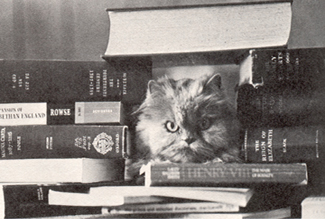 From
our pages
From
our pages
1911
The Magazine reported that a number of Chicago
faculty had been sharing their knowledge outside the University.
Divinity School professor Shailer Mathews published "Is the
Belief in the Historicity of Jesus Indispensable to Christian
Faith?" in the October American Journal of Theology.
The November issue of Elementary School Teacher included "Pestalozzian
Formalism-Degenerate Object-Teaching" by Dean of the College
of Education S. Chester Parker. But the academy wasn't the only
beneficiary of U of C expertise. The Chicago committee of the
Drama League of America counted associate professor S. H. Clark
among its membership, and the reading public benefited from English
professor Robert Herrick and the publication of his novel The
Healer.

1951
Professor
of surgery J. Garrott Allen explained his recent research on treating
irradiation sickness with blood transfusions. Hoping to discover
whether frequent transfusions could prevent or control bleeding
caused by irradiation sickness in the event of an atomic disaster,
Allen found no evidence of such a benefit. He reported, in fact,
that "there was some evidence to suggest the possibility
that more harm than benefit resulted." Allen warned: "These
results should serve as a note of caution, lest that which seems
reasonable prove wrong. It should be clearly pointed out that
the failure of blood to yield any improvement or prevention of
latent irradiation sickness does not imply that blood and plasma
will be unnecessary in fulfilling other critically important needs."
1976
In "Fear of Failing," Mark R. Horowitz, a doctoral candidate
in British history, recounted the anxiety he experienced during
the months of study for his oral exams. At one point Horowitz
even lost his cat "for six hours-she was under a 'book bridge'
comprised of the Oxford Histories of England"-and he and
his wife's social life consisted of "brushing our teeth together."
As the exams neared, Horowitz's
nervousness increased, and so did his waistline-he gained ten
pounds. He passed, but not before having a nightmare of showing
up to the exam in cutoffs, with the head of British history wearing
a football jersey. On the actual exam day he wore a suit and tie.
1991
The
University hosted an October conference examining the lessons
of the Chicago Urban Poverty and Family Life Project. The Chicago
Project, led by sociologist William Julius Wilson, sought to give
voice to the poor, describing poverty as they experienced it.
For example, one study conducted by social-sciences professor
Richard Taub looked at why some racial or ethnic groups have an
easier time than others gaining access to mainstream America.
Sociology graduate student Kathryn Neckerman, AM'88, focused her
study on why inner-city workers from blue-collar backgrounds may
have difficulty adjusting to white-collar employment, with its
"unfamiliar set of expectations, incentives, and opportunities."
-Q.J.

![]()
 From
our pages
From
our pages